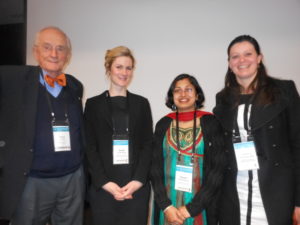

2014 Young Scholar: Annie Warren

Annie Warren
University of New England
Sponsored by the ACT Committee
Annie is currently in her first year of a Bachelor of Rural Science at the University of New England. Her particular interest is research and development in agriculture as she believes they are the key to overcoming the challenges in food production that the world is facing. In the past year she has developed her interest in the agriculture industry through work experience with dairy cattle, beef grazing, wool production and poultry. She is keen to attend this year’s Parliamentary Conference to discover what leading people in the field are discussing about efficiency and food security.
Conference report
I have gained a better understanding of the importance of nutrition in international development…”
Attending the Crawford conference was a valuable experience as it allowed me to broaden my knowledge of international development, both of the problems, and of the solutions being devised. Being part of the Crawford Fund Scholars program enabled me to attend not only the conference, but also the scholars’ day and networking dinner. It was valuable to hear speakers such as Dr Norah Omot and Professor Catherine Bertini and others who were very knowledgeable about their subjects, and also to interact on an informal level with other professionals and students.
Through attending this year’s Crawford conference, I have gained a better understanding of the importance of nutrition in international development. Two billion people around the world currently suffer from micronutrient deficiencies. The significance of this is not in the number, but in the resultant stunting of growth and decrease in children’s ability to learn at school, driving people back through the poverty cycle. I leant from Dr Norah Omot that education has a huge role in nutrition, as many people from rural areas in PNG do not have the information to make the best food choices. The positive side of this is that some micronutrient deficiency issues can be managed with existing knowledge and technologies.
One of the highlights was Professor Catherine Bertini’s address, Effective, Efficient, Ethical Solution to Feeding 9 Billion: Invest in Women. This helped me to understand the real importance of women in agriculture, and the real importance of investing in women. Women in developing countries account for 60-80% of agricultural production, but often don’t have access to resources such as training, extension or financial loans. Educated farmers are more productive, so giving women greater access to resources will greatly improve production. Professor Bertini also highlighted the importance of offering culturally sensitive aid to ensure resources provided can be accessed by women.
Attending the scholars’ day has opened my eyes to the work currently being done in international agriculture. It is inspiring to hear of the work others are actively doing to improve food security in developing countries, and how this takes many forms. It was helpful to hear from established professionals and from other young people, and this has helped me to see the opportunities there are to get involved in international development as a volunteer or otherwise.
A key benefit of the conference was the opportunity to network with other students and professionals. It was great to hear what other students are researching and increase my understanding of areas in agriculture I was less familiar with. Talking to one of the other scholars, Tara MacKenzie, broadened my knowledge of value chains and the problem of food waste at the production stage in developing countries, which contrasts with the consumer waste of developed countries such as Australia.
Overall, this year’s Crawford Conference was informative and engaging. But it wasn’t just information gained and ideas discussed that has grown my understanding of international development. Attending the conference and hearing from others has broadened my whole view of agriculture and how we, as a developed country, can be benefitting international agriculture.